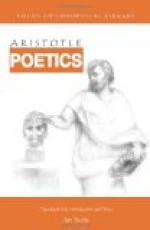Again, a beautiful object, whether it be a living organism or any whole composed of parts, must not only have an orderly arrangement of parts, but must also be of a certain magnitude; for beauty depends on magnitude and order. Hence a very small animal organism cannot be beautiful; for the view of it is confused, the object being seen in an almost imperceptible moment of time. Nor, again, can one of vast size be beautiful; for as the eye cannot take it all in at once, the unity and sense of the whole is lost for the spectator; as for instance if there were one a thousand miles long. As, therefore, in the case of animate bodies and organisms a certain magnitude is necessary, and a magnitude which may be easily embraced in one view; so in the plot, a certain length is necessary, and a length which can be easily embraced by the memory. The limit of length in relation to dramatic competition and sensuous presentment, is no part of artistic theory. For had it been the rule for a hundred tragedies to compete together, the performance would have been regulated by the water-clock,—as indeed we are told was formerly done. But the limit as fixed by the nature of the drama itself is this: the greater the length, the more beautiful will the piece be by reason of its size, provided that the whole be perspicuous. And to define the matter roughly, we may say that the proper magnitude is comprised within such limits, that the sequence of events, according to the law of probability or necessity, will admit of a change from bad fortune to good, or from good fortune to bad.
VIII
Unity of plot does not, as some persons think, consist in the Unity of the hero. For infinitely various are the incidents in one man’s life which cannot be reduced to unity; and so, too, there are many actions of one man out of which we cannot make one action. Hence, the error, as it appears, of all poets who have composed a Heracleid, a Theseid, or other poems of the kind. They imagine that as Heracles was one man, the story of Heracles must also be a unity. But Homer, as in all else he is of surpassing merit, here too—whether from art or natural genius—seems to have happily discerned the truth. In composing the Odyssey he did not include all the adventures of Odysseus—such as his wound on Parnassus, or his feigned madness at the mustering of the host—incidents between which there was no necessary or probable connection: but he made the Odyssey, and likewise the Iliad, to centre round an action that in our sense of the word is one. As therefore, in the other imitative arts, the imitation is one when the object imitated is one, so the plot, being an imitation of an action, must imitate one action and that a whole, the structural union of the parts being such that, if any one of them is displaced or removed, the whole will be disjointed and disturbed. For a thing whose presence or absence makes no visible difference, is not an organic part of the whole.




